What does Autumn smell like to you? For me, it’s none other than… Cassia.
Living in the Midwest, we are blessed to be surrounded by forests that seize the opportunity of autumn to glamorize themselves with brilliant colors. Whiffs of spicy and earthy aromas fill the air, creating an enchanting sensory experience.
I adore using essential oils to capture the essence of autumn and bring those nostalgic scents into my home. One of my favorite oils for this purpose is Cassia Essential Oil. Derived from the Cinnamomum cassia plant, closely related to cinnamon, this essential oil boasts a warm, spicy fragrance that epitomizes the fall season. I especially love using Cassia Essential Oil in candles and various autumn-inspired creations, infusing my home with the comforting warmth of autumn.
What is Cassia Essential Oil?
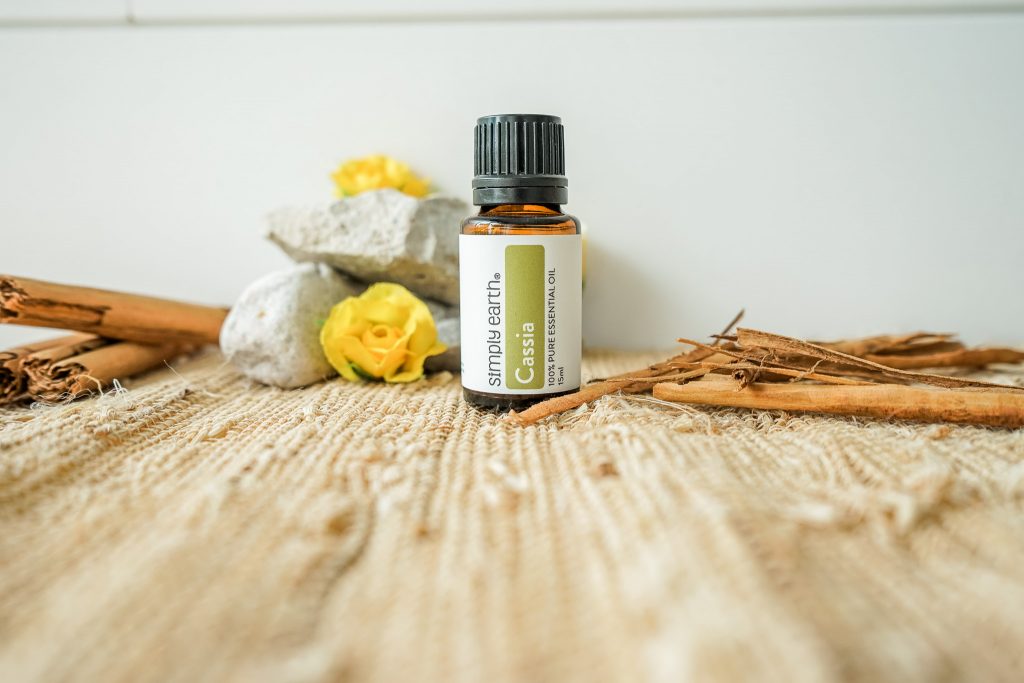
Cassia Essential Oil is a golden yellow to brown oil with medium consistency extracted from the leaves of the Cinnamomum cassia tree. This evergreen can grow up to 20 meters tall. The tree is adorned with thick, leathery leaves and white flowers, making it as visually striking as it is olfactorily delightful. The essential oil is obtained through steam distillation, which captures its uniquely potent properties. Characterized by its spicy and warm aroma, Cassia Essential Oil holds a medium note, which makes it an exceptional addition to your autumn fragrance repertoire.
Cassia Essential Oil Benefits

Promotes Circulation
According to this study1, Cassia Essential Oil creates warmth when applied topically and boosts circulation. It can soothe muscle pain caused by weak blood circulation. Coupled with its anti-inflammatory effects, as suggested by this study2, Cassia may be used to naturally ease bodily discomforts.
Supports Women’s Wellness
Because of its properties mentioned above, this essential oil may help soothe muscle tightness and headaches associated with menstruation. It also helps alleviate other PMS symptoms like nausea and drowsiness, which are further explained below.
Uplifts
Besides being reminiscent of fall, Cassia’s bright aroma acts as an antidepressant, as per this study3, and brings about warm feelings. It’s very stimulating and may make you more alert. I love using Cassia Essential Oil in these recipes.
Cleans
Like its close relative, Cinnamon Essential Oil, Cassia is a great cleaner. One study4 says it has antimicrobial properties, and another suggests it has antiviral effects5. It’s great to use as a DIY cleaner or room spray when colds and sickness have been going through the house.
Aids Digestion
The Cinnamomum cassia plant is popular in traditional Chinese medicine to help relieve gas, nervous stomach, and discomfort. As mentioned above, it is effective in inhibiting the growth of bacteria, so some may find it helpful in easing diarrhea.
Moreover, according to this study6, Cassia Essential Oil is great when nausea hits as it helps reduce retching and prevent vomiting.
Boosts Immunity
Because of the benefits mentioned above, Cassia Essential Oil can support immunity, especially when seasonal threats are lingering.
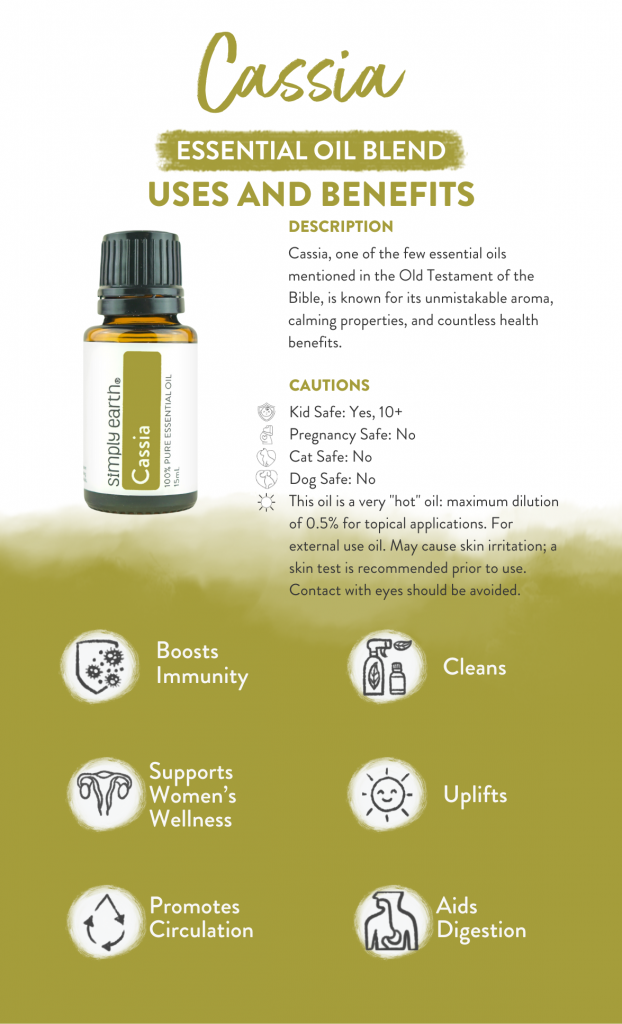
Cassia Essential Oil Uses & Recipes
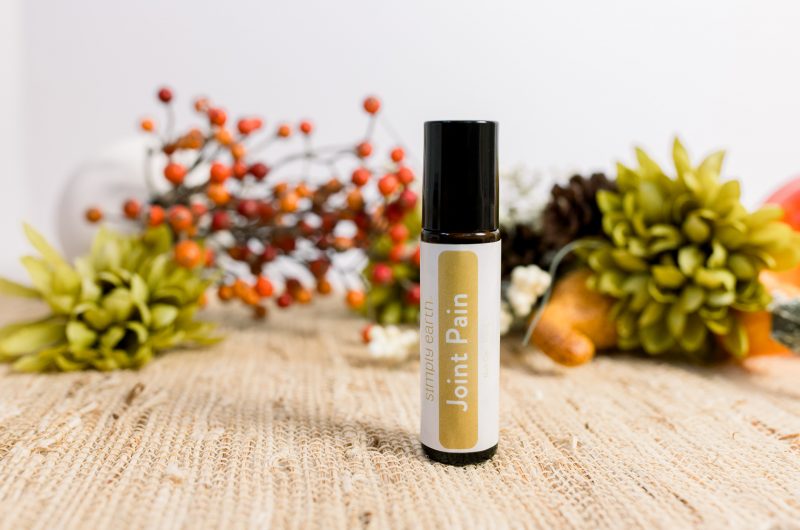
Candle Recipes
Cassia is one of our favorite scents for candle recipes due to its uplifting aroma, which works exceptionally well in candles. Additionally, the warm and spicy scent of Cassia Essential Oil can fill any room with a cozy, autumnal atmosphere, making it perfect for creating a relaxing environment.InsertRetry
- Orange and Cassia Candle
- Cassia and Balsam Fir Candle
- Warm Honey Beeswax Sheet Candles
- Lemonade Stand Candle
Inhaler and Roll-On Recipes
Cassia Essential Oil can also be incorporated into essential oil inhalers or roll-on recipes, making it convenient for on-the-go use. These methods allow for aromatic enjoyment and safe topical application to help soothe ailments.
Diffuser Blend Recipes
Cassia Essential Oil is a magnificent addition to your diffuser blend recipes, enhancing the atmosphere with its warm, spicy scent. Not only does it bring the smell of fall into your home, but it also offers numerous benefits, from uplifting mood to boosting immunity.
- Falling for Fall Diffuser Blend
- Autumn Ambience Diffuser Blend
What This Oil Blends Well With
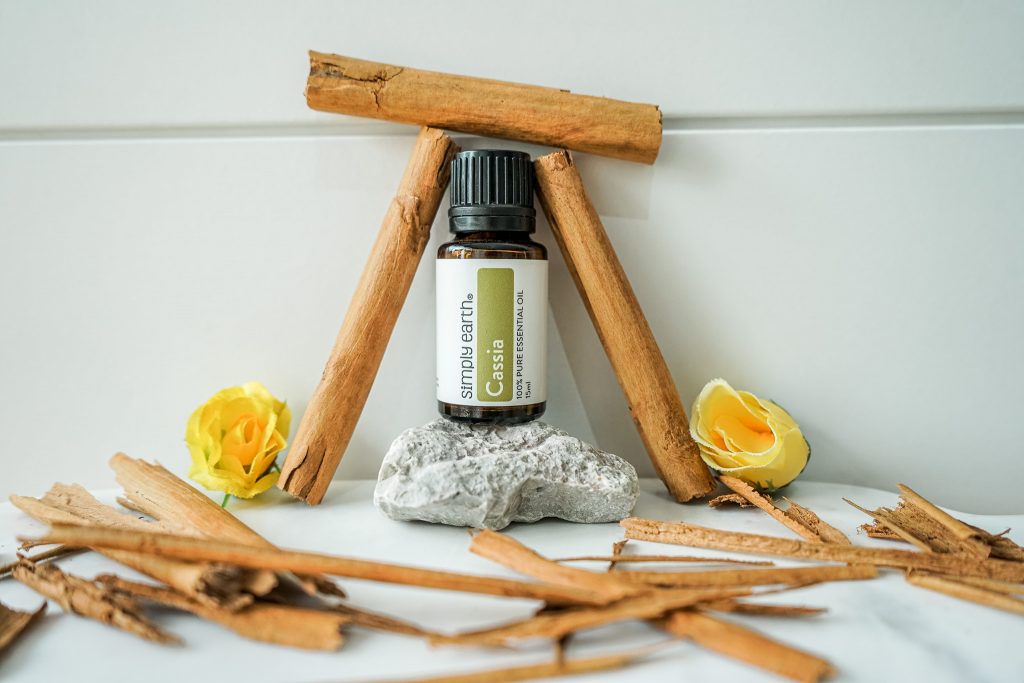
This oil is a close relative of Cinnamon Essential Oil and can often be used as a replacement for It. However, many consider Cassia to have a sweeter aroma than Cinnamon Essential Oil.
Cassia’s spicy, slightly woody, cinnamon-like scent blends well with Cedarwood (Himalayan), Clove, Frankincense, Lavender, Lemon, Wild Orange, and Ylang-ylang Essential Oils.
Simply Earth Blends That Use This Oil
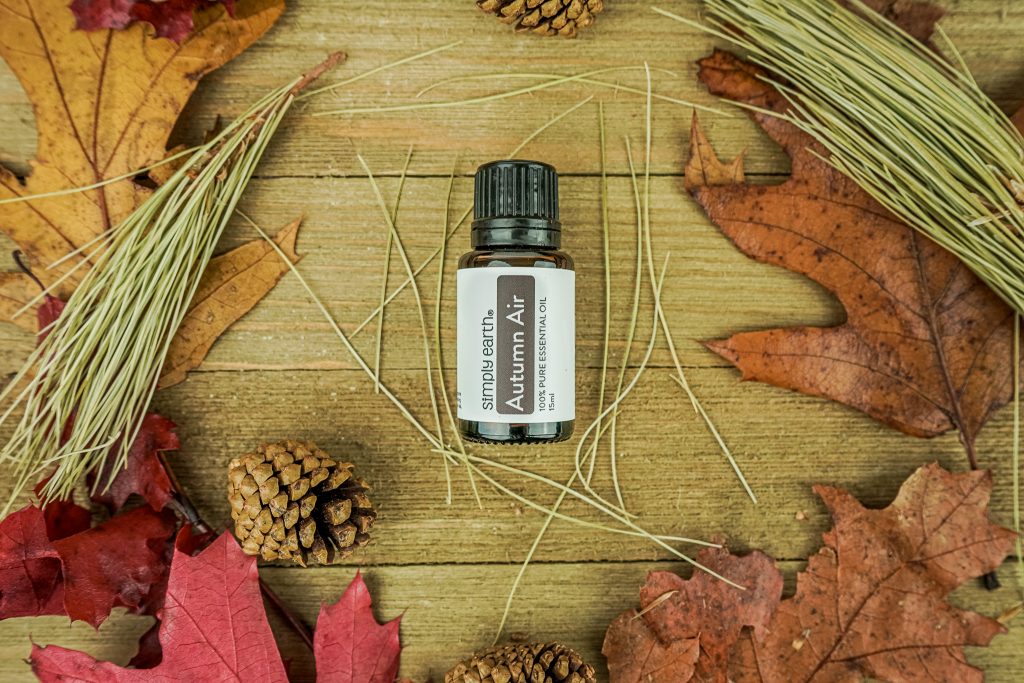
Autumn Air Blend
Aroma: Spicy
Autumn Air Essential Oil Blend has the perfect aroma for Fall. It’s citrusy and spicy, just the right smell to cuddle up with a warm cup of coffee and a sweater. Add a few drops to your diffuser or homemade candle to experience the heartwarming embrace of Autumn Air all season long.
What’s the Science Behind This Oil?
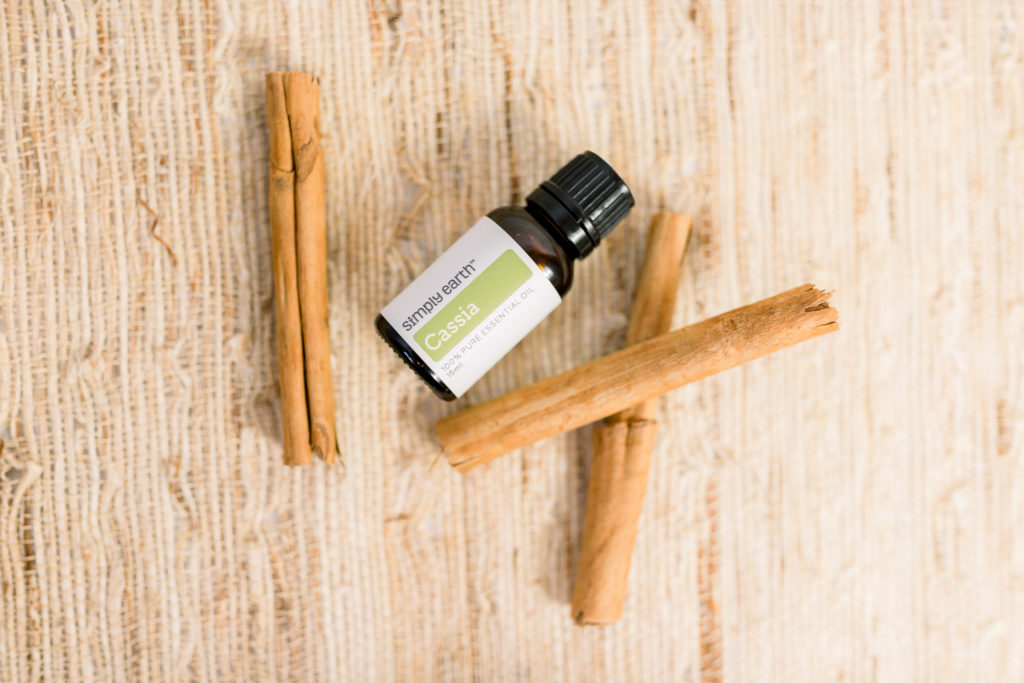
History of Cassia Essential Oil
Not only is Cassia considered one of the 50 fundamental Traditional Chinese Herbs, but it is also one of the oils mentioned in the Bible. Its rich history of use underscores its remarkable versatility and longstanding value. Cassia’s unmistakable warm and spicy aroma earns Cassia praise for evoking comfort. Its widely recognized calming properties make it a go-to essential oil for stress relief and for creating a serene environment. Furthermore, Cassia Essential Oil offers countless health benefits, from improving circulation and easing muscle discomfort to supporting digestive health and boosting immunity. These attributes make it indispensable to any essential oil collection, particularly during autumn’s therapeutic and aromatic embrace.
Chemical Constituents
e- Cinnamaldehyde
Cinnamaldehyde occurs naturally and gives cinnamon its flavor and odor. This pale yellow, viscous liquid appears in the bark of cinnamon trees and other species of Cinnamomum. Cinnamaldehyde’s most obvious application is flavoring chewing gum, ice cream, candy, e-liquid, and beverages. It is also used in some perfumes with natural, sweet, or fruity scents. Cinnamaldehyde has been tested as a safe and effective insecticide against mosquito larvae. It also has antibacterial and antifungal properties. Moreover, it has some miscellaneous uses, such as being a corrosion inhibitor for steel and other alloys.
O-Methoxycinnamaldehyde
Ortho-Methoxycinnamaldehyde is a natural compound of Cinnamomum cassia with antitumor activity. It is commercially and industrially applied as a flavor and fragrance agent.
Cinnamyl Acetate
Cinnamyl acetate naturally occurs in plants and has a sweet floral-fruity fragrance. It is used in cosmetics, some toiletries, and non-cosmetic products like detergents.
What Earthies Are Saying About This Oil

Simply Earth & Malagassi Farm
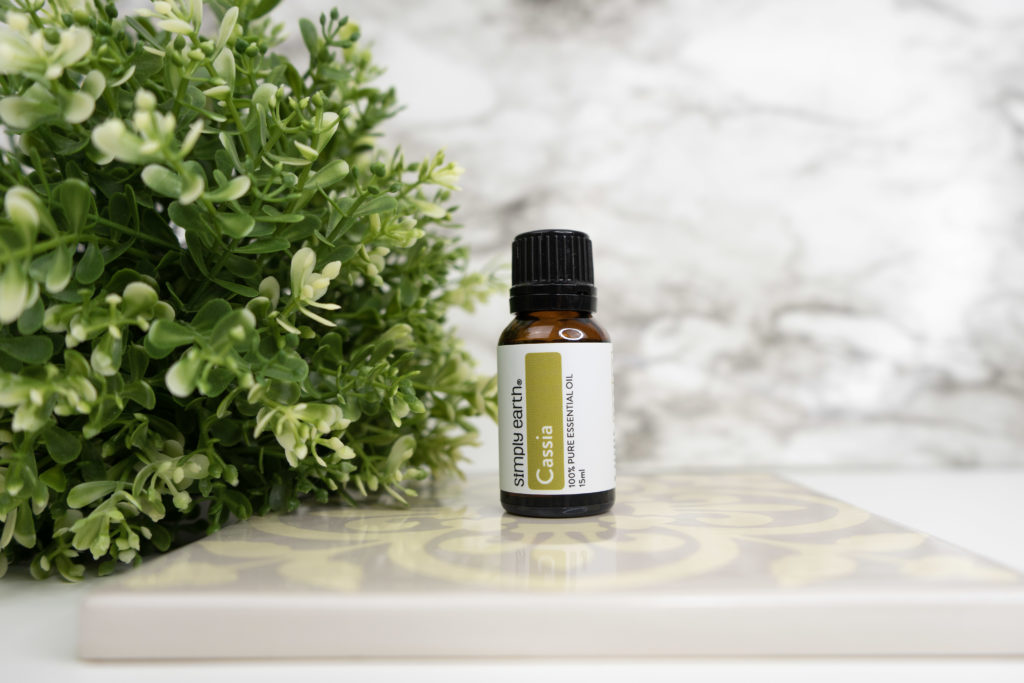
Simply Earth proudly sources its Cassia Essential Oil from the renowned Malagassi Farm in the high mountains of Northern Vietnam. Ethnic minority farmers diligently cultivate and nurture Cassia (Cinnamomum cassia), also known as Vietnamese cinnamon, and have seen tremendous growth in Cassia plantations in recent years. This rise has significantly bolstered the local economy and improved the livelihoods of indigenous families.
From March to September, the harvesting season aligns perfectly with the abundant sunlight for drying the bark. After carefully nurturing the cassia trees in nurseries for three years, the farmers transplant them to mountain slopes, where they begin to yield productive crops by age six. However, Malagassi farmers often allow the trees to reach full maturity to ensure superior quality. This prized Cassia Essential Oil, exclusive to Vietnam and a small region in southern China, owes its uniqueness to the area’s specific climate and soil conditions. Extracted through a precise steam distillation process refined over 25 years, the meticulous care taken from start to finish guarantees the highest quality essential oil.
Things to Remember With This Oil

Always dilute an essential oil when using it on the skin. This essential oil is unlikely to cause skin irritation when diluted properly. If the oil has been oxidized (left with the cap off for long periods of time) it is more likely to cause skin irritation. Check out this dilution chart for diluting this essential oil properly.

This oil is generally not safe to use if you are pregnant. Consult your doctor prior to use.

This essential oil is safe to use with kids 10+.

For more information on using essential oils with cats, check out this blog post.

Dogs may find this oil irritating. However, we do not expect your dog to be disturbed if you use this oil on yourself. Just be mindful of your pet’s behavior. For more information on using essential oils with dogs, check out this blog post.
We don’t recommend ingesting essential oils unless under the direction of a doctor certified in aromatherapy. For more information on why we don’t ingest essential oils check out this blog post.
*Please note: This post is a compilation of suggestions made by those that have extensively used essential oils and has not been verified scientifically with clinical tests nor reviewed by medical experts. It is anecdotal information and should be treated as such. For serious medical concerns, please consult your doctor. The statements given in this blog post have not been verified by the FDA
References:
- Himanshu S, Prerna C, Surender S. Evaluation of the anti-arthritic activity of Cinnamomum cassia bark extract in experimental models. 2018 Dec
- Pannee C, Chandhanee I, Wacharee L. Antiinflammatory effects of essential oil from the leaves of Cinnamomum cassia and cinnamaldehyde on lipopolysaccharide-stimulated J774A.1 cells. 2014 Oct
- Etaee F, Komaki A, et al. The effects of cinnamaldehyde on acute or chronic stress-induced anxiety-related behavior and locomotion in male mice. 2019 May
- Ooi LS, Li Y, Kam SL, Wang H, Wong EY, Ooi VE. Antimicrobial activities of cinnamon oil and cinnamaldehyde from the Chinese medicinal herb Cinnamomum cassia Blume. 2006
- A.T. Mbaveng, V. Kuete, in Medicinal Spices and Vegetables from Africa, 2017
- Imran Ahmad Khan, Abdul Aziz, Hafiz Shoaib Sarwar, Shaukat Hussain Munawar, Zahid Manzoor, Haseeb Anwar. Evaluation Of Antiemetic Potential Of Aqueous Bark Extract Of Cinnamon Loureiroi. 2014 Jan

